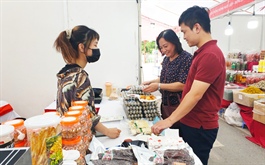Food exporters turn focus to domestic market
Food exporters turn focus to domestic market
Vietnamese are tending to consume foods of clear origin and high quality after the COVID-19 pandemic, causing many export-oriented food brands to turn their attention to the domestic market.

The market with a population of nearly 100 million is in fact attracting both foreign and local food companies.
Phan Minh Thong, general director of Phuc Sinh Company, which has been exporting pepper, coffee and farm produce for the last 20 years, said Viet Nam is a very large market for coffee products.
His company exports 65,000-70,000 tonnes of coffee products a year, whereas domestic sales account for less than 1 per cent of that.
Phuc Sinh would focus more on promoting its Blue Son La Coffee brand in the domestic market, he added.
Viet Nam may be the world’s second largest coffee exporter, but Vietnamese have to drink coffee mixed with other ingredients, and that is the reason why his company wants to offer local customers pure and export-quality coffee, he claimed.
He hoped consumers would support K Coffee when offered pure, good-quality coffee at reasonable prices and told about it.
In 2022, Phuc Sinh Group plans to build more coffee processing plants to supply the domestic market and venture further into the spice industry.
Le Ba Minh, director of Pacific Foods Joint Stock Company, a fish sauce exporter to the US, claimed his company’s fish sauces are the top sellers on Amazon after just a year since launch.
In June, it started selling in the domestic market through e-commerce platform Shopee.
"The fish sauces for the domestic market have the same quality as for exports. We prepared for two years to develop our domestic market."
Dang Ba Long, director of the HCM City Honey Bee Joint Stock Company (Behonex), said in recent years the company's domestic sales have gone quite well, growing at 15 per cent a year.
In the past, Behonex products were mainly exported, with little domestic sales as Vietnamese used to think honey was only consumed when sick, he said.
But now honey is used by many people as an ingredient in cooking and beverages.
Another important reason is that Vietnamese people's incomes are increasing, and they could afford premium foods, Long said.
Domestic products are however facing fierce competition from imports, he said.
Analysts said Vietnamese consumers used to be price-conscious, but living standards are now increasing due to rapid economic growth and food safety has become a factor, persuading exports-only firms to look at the domestic market, especially with COVID hitting exports.




















